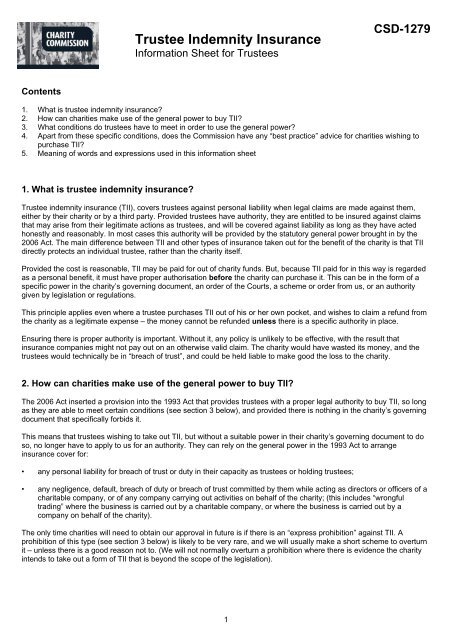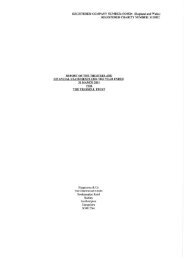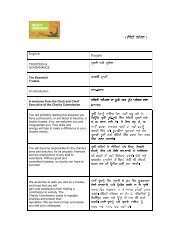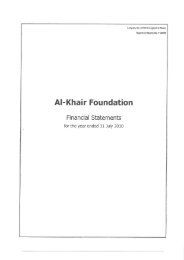CSD-1279 Trustee Indemnity Insurance - Charity Commission
CSD-1279 Trustee Indemnity Insurance - Charity Commission
CSD-1279 Trustee Indemnity Insurance - Charity Commission
You also want an ePaper? Increase the reach of your titles
YUMPU automatically turns print PDFs into web optimized ePapers that Google loves.
Contents<br />
<strong>Trustee</strong> <strong>Indemnity</strong> <strong>Insurance</strong><br />
Information Sheet for <strong>Trustee</strong>s<br />
1<br />
<strong>CSD</strong>-<strong>1279</strong><br />
1. What is trustee indemnity insurance?<br />
2. How can charities make use of the general power to buy TII?<br />
3. What conditions do trustees have to meet in order to use the general power?<br />
4. Apart from these specific conditions, does the <strong>Commission</strong> have any “best practice” advice for charities wishing to<br />
purchase TII?<br />
5. Meaning of words and expressions used in this information sheet<br />
1. What is trustee indemnity insurance?<br />
<strong>Trustee</strong> indemnity insurance (TII), covers trustees against personal liability when legal claims are made against them,<br />
either by their charity or by a third party. Provided trustees have authority, they are entitled to be insured against claims<br />
that may arise from their legitimate actions as trustees, and will be covered against liability as long as they have acted<br />
honestly and reasonably. In most cases this authority will be provided by the statutory general power brought in by the<br />
2006 Act. The main difference between TII and other types of insurance taken out for the benefit of the charity is that TII<br />
directly protects an individual trustee, rather than the charity itself.<br />
Provided the cost is reasonable, TII may be paid for out of charity funds. But, because TII paid for in this way is regarded<br />
as a personal benefit, it must have proper authorisation before the charity can purchase it. This can be in the form of a<br />
specific power in the charity’s governing document, an order of the Courts, a scheme or order from us, or an authority<br />
given by legislation or regulations.<br />
This principle applies even where a trustee purchases TII out of his or her own pocket, and wishes to claim a refund from<br />
the charity as a legitimate expense – the money cannot be refunded unless there is a specific authority in place.<br />
Ensuring there is proper authority is important. Without it, any policy is unlikely to be effective, with the result that<br />
insurance companies might not pay out on an otherwise valid claim. The charity would have wasted its money, and the<br />
trustees would technically be in “breach of trust”, and could be held liable to make good the loss to the charity.<br />
2. How can charities make use of the general power to buy TII?<br />
The 2006 Act inserted a provision into the 1993 Act that provides trustees with a proper legal authority to buy TII, so long<br />
as they are able to meet certain conditions (see section 3 below), and provided there is nothing in the charity’s governing<br />
document that specifically forbids it.<br />
This means that trustees wishing to take out TII, but without a suitable power in their charity’s governing document to do<br />
so, no longer have to apply to us for an authority. They can rely on the general power in the 1993 Act to arrange<br />
insurance cover for:<br />
• any personal liability for breach of trust or duty in their capacity as trustees or holding trustees;<br />
• any negligence, default, breach of duty or breach of trust committed by them while acting as directors or officers of a<br />
charitable company, or of any company carrying out activities on behalf of the charity; (this includes “wrongful<br />
trading” where the business is carried out by a charitable company, or where the business is carried out by a<br />
company on behalf of the charity).<br />
The only time charities will need to obtain our approval in future is if there is an “express prohibition” against TII. A<br />
prohibition of this type (see section 3 below) is likely to be very rare, and we will usually make a short scheme to overturn<br />
it – unless there is a good reason not to. (We will not normally overturn a prohibition where there is evidence the charity<br />
intends to take out a form of TII that is beyond the scope of the legislation).
3. What conditions do trustees have to meet in order to use the general power?<br />
There must be no express prohibition<br />
<strong>Trustee</strong>s need to examine their charity’s governing document to make sure the purchase of TII is not expressly forbidden.<br />
An “express prohibition” will specifically refer to TII, and will not be a part of any wider provision against trustees<br />
benefiting personally. The general power now in the 1993 Act overrides that type of prohibition, which may often be<br />
described as a “trustees [or directors] not to be personally interested” clause.<br />
The general power also overrides the need for our approval where use of a trustee benefit provision is stated to be<br />
conditional upon our “prior written consent”.<br />
If there does appear to be an express prohibition, the trustees should contact us, so that we can consider whether a short<br />
scheme should be made overturning it. This type of scheme does not require any advertising and can be made quickly.<br />
We will not normally need to give our authority in the scheme to the purchase of TII. When the prohibition is set aside, the<br />
charity can simply make use of the general power.<br />
TII must be in the best interests of the charity<br />
The trustees must be clear their decision to purchase TII is based on the genuine need, and that risks and potential<br />
liabilities have been identified that justify spending charity funds on insurance cover. They should ensure the cost is<br />
reasonable, and will not be a drain on the charity’s finances, or in any way adversely affect its activities. They will need to<br />
be satisfied the insurance policy they take out is suitable for the charity, and that they are clear on the extent of insurance<br />
cover – after taking expert advice if necessary.<br />
<strong>Trustee</strong>s must observe a “duty of care”<br />
The general power also requires that trustees are subject to the “duty of care” in the <strong>Trustee</strong> Act 2000 when making a<br />
decision to take out TII.<br />
In broad terms, trustees must exercise all reasonable care and skill when making and carrying out a decision, allowing for<br />
any special knowledge or experience an individual trustee might have, particularly when acting in the course of a<br />
business or profession.<br />
They must exercise the power responsibly in the interests of their charity, and take independent professional advice as<br />
appropriate when selecting the right insurance policy for their charity.<br />
<strong>Trustee</strong>s must ensure the insurance policy contains certain exclusions<br />
Where TII is taken out, the insurance policy must include a clause to ensure that it will not cover:<br />
• liability in respect of fines imposed in criminal proceedings, or penalties arising from regulatory action; (for example,<br />
penalties imposed by the Financial Services Agency or Companies House.);<br />
• liability arising from defending criminal proceedings in which the trustee is convicted of fraud, dishonesty, or wilful or<br />
reckless misconduct; and<br />
• liability arising out of conduct which the trustee knew, or should have known, was not in the interests of the charity.<br />
These are specifically excluded by law from the type of indemnity that TII will cover.<br />
4. Apart from these specific conditions, does the <strong>Commission</strong> have any “best practice” advice<br />
for charities wishing to purchase TII?<br />
Yes. We strongly recommend that, before considering the purchase of TII, trustee bodies should check whether they<br />
have in place policies and procedures that help reduce risk to themselves and the charity (see ‘Charities and Risk<br />
Management’ on our website). In particular, we advise that trustees:<br />
• familiarise themselves with their charity’s governing document and their own powers and duties – including what<br />
powers they have to delegate authority to an agent or employees;<br />
• seek professional or other expert advice (including from us) where they are unsure about their duties and liabilities;<br />
• find out what areas of law might have an impact on the activities of the charity; for example, employment, health and<br />
safety, human rights, data protection;<br />
2
• before entering into a contract, satisfy themselves the charity has the resources to meet its part of the contract, and<br />
understand the consequences of not meeting an obligation in the contract;<br />
• tighten up procedures within their charity where they have identified a potential risk;<br />
• consider and, if necessary take professional advice, about the different types of insurance that might be suitable for<br />
their charity; and<br />
• make sure they understand what liabilities the policy they take out will actually cover.<br />
In this respect, trustees should note that TII will not normally cover them against the risk of personal liability arising from<br />
contracts they have entered into on behalf of their charities. Nor will they cover:<br />
• redundancy payments made to employees of the charity;<br />
• liabilities under a lease (eg, for the repair or maintenance of a building);<br />
• occupiers’ liability for injury to the public whilst on the charity’s property (public liability insurance);<br />
• liability for fraud or dishonesty by employees (fidelity guarantee insurance); or<br />
• liability for faulty, inaccurate or wrongful advice given either for a fee, or under contract (professional indemnity<br />
insurance).<br />
Further explanation of the different types of insurance that may be suitable for charities is contained in our booklet<br />
Charities and <strong>Insurance</strong> (CC49).<br />
5. Meaning of words and expressions used in this information sheet<br />
The 1993 Act means the Charities Act 1993.<br />
The 2006 Act means the Charities Act 2006.<br />
Breach of trust means a breach of any duty imposed on a trustee. For charity trustees, these duties may be imposed by<br />
the provisions of a charity’s governing document, laws and regulations, or Orders of the Court or the <strong>Charity</strong> <strong>Commission</strong>.<br />
A duty is something which trustees have to do. It is distinguished from a power, which trustees may or may not choose to<br />
use. (See our booklet The Essential <strong>Trustee</strong> (CC3) – for more details about trustees’ duties and responsibilities).<br />
Charitable company means a company:<br />
• which is formed and registered under the Companies Act 2006; this will also include a company already registered<br />
under the Companies Act 1985, or one which was already in existence at that time;<br />
and which<br />
• is established for exclusively charitable purposes.<br />
Companies Act means the Companies Act 2006.<br />
Court means the High Court or any other court in England and Wales having jurisdiction over charities, or any judge or<br />
officer exercising that jurisdiction.<br />
Governing document means a legal document setting out the charity’s purposes and, usually, how it is to be<br />
administered. It may be a trust deed, constitution, memorandum and articles of association, will, conveyance, Royal<br />
Charter, Scheme of the <strong>Commission</strong>, or other formal document.<br />
Holding trustee means individuals who are appointed to hold the legal title of charity property. They can only act on the<br />
lawful instructions of the charity <strong>Trustee</strong>s and in accordance with any provisions contained in the governing document.<br />
The governing document may confer other duties or responsibilities on holding trustees and so it is important that it is<br />
consulted in every case.<br />
Must is used where there is a specific legal or regulatory requirement affecting trustees or a charity. <strong>Trustee</strong>s (or their<br />
agents or employees) must comply with these requirements.<br />
Recommend and advise are used when we are suggesting actions that we consider to be good practice, but that do not<br />
currently represent a legal requirement.<br />
3
Should is used for items we regard as minimum good practice, but for which there is no specific legal requirement.<br />
<strong>Trustee</strong>s should follow good practice guidance unless there’s a good reason not to.<br />
Third party is used to mean anyone who is outside the charity: that is to say, someone other than the charity’s trustees,<br />
volunteers, members of staff, or the charity itself.<br />
<strong>Trustee</strong> means a charity trustee. <strong>Charity</strong> trustees are the people who are responsible for the general control and<br />
management of the administration of the charity. In the charity’s governing document they may be called trustees,<br />
managing trustees, committee members, governors or directors, or they may be referred to by some other title.<br />
4<br />
V4 3/07





